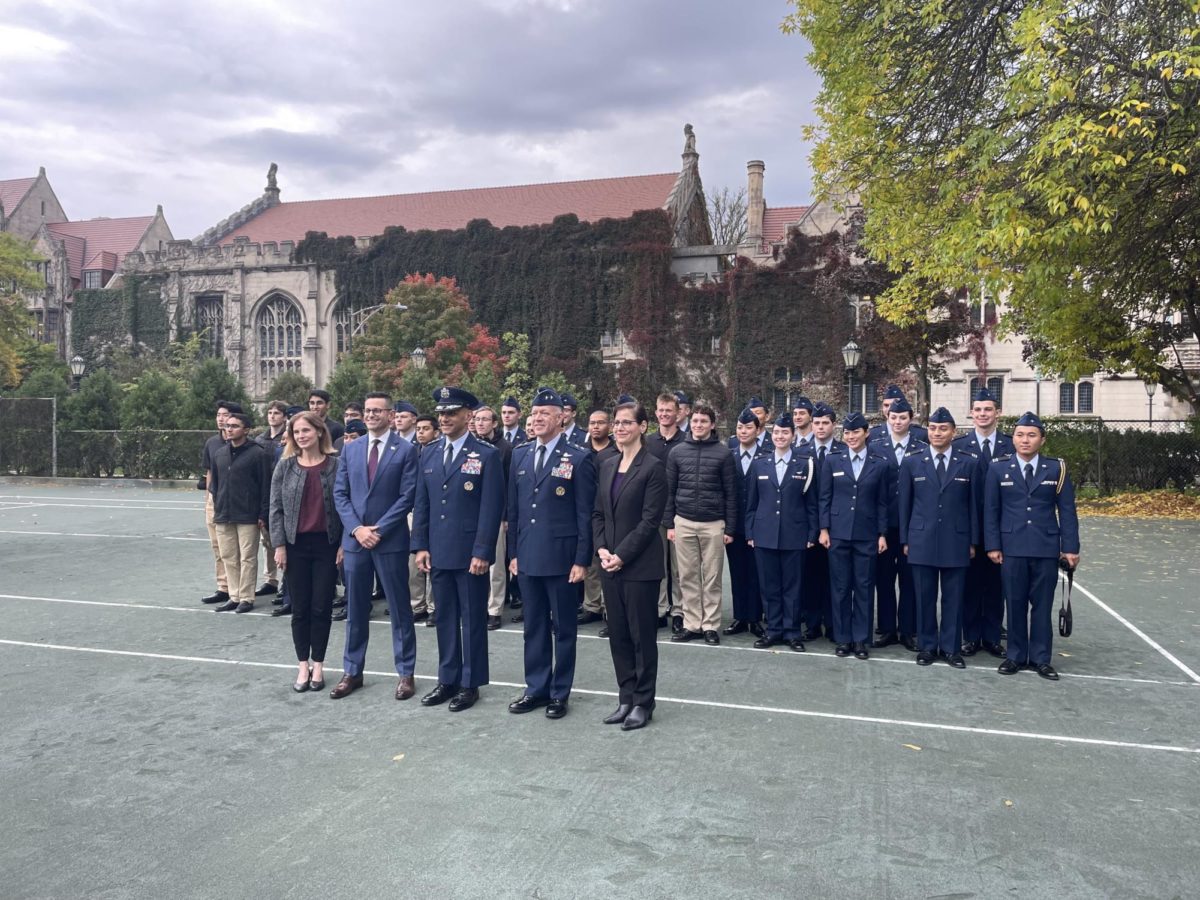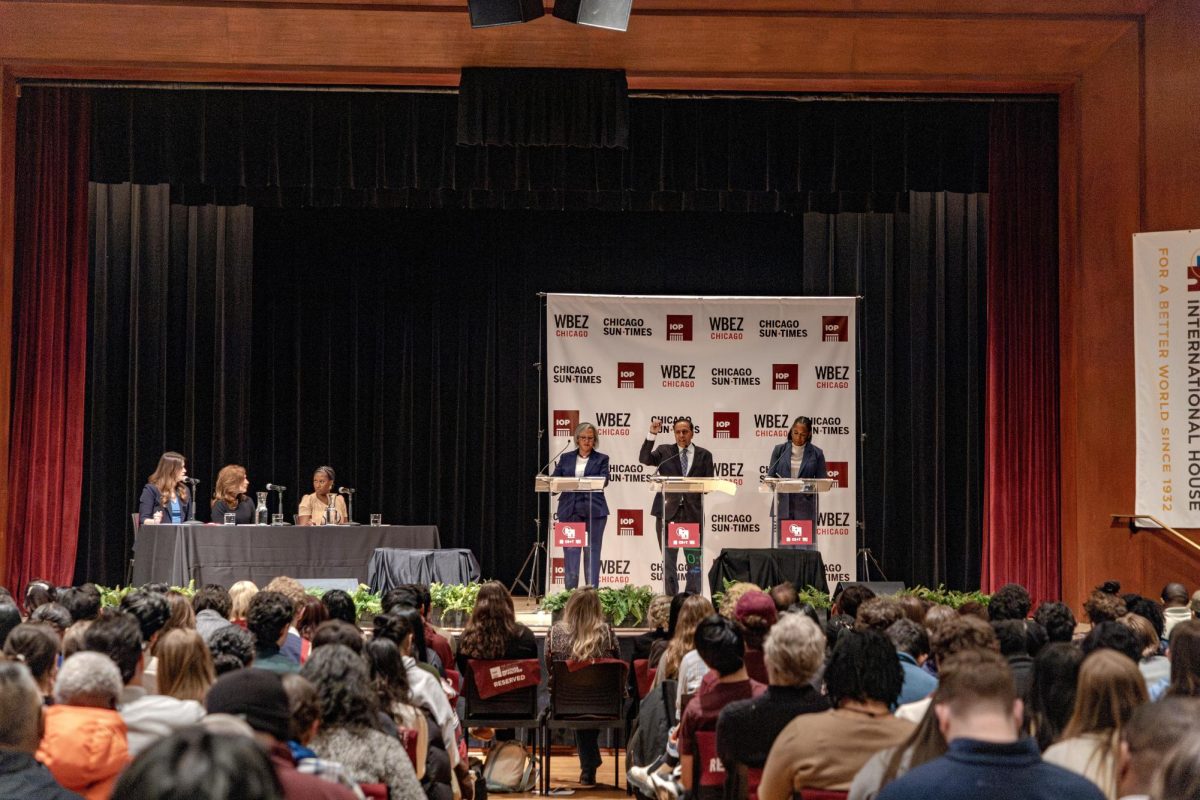The University hosted the ribbon-cutting ceremony for its new Air Force Reserve Officer Training Corps (AFROTC) program on Friday, ushering in a new relationship between UChicago and the military.
Under the AFROTC program, the University will host training programs and classes taught by the Air Force to undergraduate cadets. Such classes have already been taught at the University for a year, but the October 13 ceremony made these sessions official.
The presence of an AFROTC program is not new to the Chicago area. Nearby Illinois Institute of Technology (IIT) was the first to begin hosting the program in 1951. The University had sent students to AFROTC at IIT for over 40 years before the Air Force began planning to move the program hub into Hyde Park in 2020.
“We started to kind of look at some of the things that UChicago had to offer as far as diversity of students—I mean that racially, socioeconomically, and in [students’] experiential background—and we also noticed that we had a good number of cadets from UChicago versus our other universities,” Lieutenant Colonel Matthew Weaver, who works as the commander of the AFROTC detachment in Chicago, told The Maroon.
With the opening of the center, UChicago joins three other large Chicago colleges which operate as ROTC “hubs.” Northwestern has hosted Chicago’s Navy ROTC since before WWII, while the University of Illinois Chicago and Loyola University split Army ROTC duties.
The Chicagoland AFROTC program is made up of 17 different universities, referred to as “satellite sites” by military officials, in the Chicago area. Cadets travel to UChicago’s campus each week—usually by carpool—to attend classes on subjects like leadership and international relations. Currently, the greater Chicago AFROTC has more than 70 students, who hail from 11 of the 17 participating universities.
Much of the appeal of joining an ROTC comes from the U.S. military’s hefty pockets. Many students are able to attend top colleges on full-ride scholarships. This scholarship is contingent on signing a contract with the military promising four years of service with one’s respective branch after graduation. Non-scholarship college students are also able to join UChicago’s AFROTC for a year without any penalty.
Even those not on scholarship have $18,000 of their college tuition paid for in their junior and senior years upon signing their four-year contract under the newly established Charles McGee Leadership Award. “Until we’re paying you money for something…you don’t owe us anything,” Weaver said.
Something which sets ROTC students apart from regular undergraduates is how early cadets must start their days. UChicago’s AFROTC classes currently start at 6 a.m.; this, coupled with the fact that AFROTC students come from as far north as National Louis University in Evanston and as far south as Chicago State University in Roseland, means some cadets may be looking at a 4 a.m. alarm if they want to avoid tardiness.
Weaver explained that there simply wasn’t another time in which to have class. “I have to juggle 15 different schools, so imagine juggling that many class schedules,” he said. “If I go super early, there are no class conflicts.” He added that evening classes tended to annoy cadets more than early ones. “If I [teach] super late, all the cadets will be mad at me because they also have a social life,” he said.
Following their first class at 6 a.m., cadets are filtered into a “leadership lab” from 7–9 a.m., in which they learn how to manage and command others. Twice a week, cadets are made to do physical training, which takes place in three different gyms around Chicago.
Weaver highlighted a class he teaches to AFROTC seniors on the subject of international studies. “We take the entire semester and go around the entire globe and talk about those kinds of hotspot things that are going on. And the interesting part about it is there are no answers. That’s why there’s still conflict,” he said. “We’re just giving them all sides of the story, and then giving them the Department of Defense’s stance, and how they have a role to play in the diplomatic machine.”
The Chicago AFROTC’s relatively small size allows for a slim number of staff to run the operation. Only two officers, of which Weaver is one, serve as “teachers” in the program. This may need to change in the next few years, however. Weaver stated that the Air Force’s goal is to have more students coming to UChicago already involved, or looking to be involved, with the AFROTC. “If the proverbial advertisement is in your face, and it’s in your backyard, you’re more prone to buy the product,” he said.
Of the more than 70 students involved in the program, only 20 currently attend UChicago, but both numbers may rise quickly as word gets out about the program. The Air Force expects that far more students interested in military careers after university will choose UChicago, and that UChicago will turn more students into AFROTC members. Space may present an issue if this comes to pass; currently, ROTC classes are held in Harper Library. Weaver stated that the Air Force is “looking to continue to upgrade our facilities as we are here.”
Weaver was quick to add, however, that the Air Force’s goal was not to build quantity so much as quality within the UChicago program. “It’s very similar to what you would get from a UChicago grad: a very well-rounded student who has a lot of experience to bring into the industry upon graduation,” Weaver said. “That’s exactly what I want to do with my Air Force ROTC officers. It just happens to be that that industry is the Department of Defense.”
When asked if cadets might feel overwhelmed managing UChicago’s famously difficult course load along with their ROTC classes, Weaver responded in the negative. “Ours is a competitive program. You come in as a freshman or sophomore and you have to compete for a slot to become a junior or senior…The average GPA is about 3.3. You’ll have about a 92, 93, on your physical fitness test and a couple other different markers along the way. We’ve found that our average student, especially those who have a home at the University of Chicago, are already top achievers.”
Hosting the AFROTC is a big step for the University in its relationship with the military. The ceremony on Friday was attended by a number of prominent military figures—such as Alex Wagner, the assistant secretary of the Air Force for manpower and reserve affairs—as well as prominent University officials, including Dean of the College Melina Hale and Dean of Students Michele Rasmussen. Wagner gave the keynote remarks on the Quadrangle Club Tennis Courts. Following the ceremony, as Army, Navy, Air Force, and Space Force flags shook in the October cold, a refueling tanker roared past in a planned flyover.
Weaver remarked that Air Force programs like UChicago’s are needed in the modern world. “We’re in a generation where, to be very frank, politics and government things of that nature can be a little bit contentious, right? But what some people fail to realize is that as an officer of the United States Air Force, I’m sworn to protect the Constitution, not any particular politicians,” he said. “We’re in need of [such] people. You know, we’re in a world where we have near competitors, China, Russia, Iraq, Iran, things of that nature, where we need some big brains who have the ability to be self-starters, to take over for the older generation and continue to solve problems, and bring about peace in the world we live in.”
Correction, October 22, 2023: A previous version of this article incorrectly stated that the flyover was executed by a fighter jet. The plane used in the flyover, a Boeing KC-135 Stratotanker, is a refueling jet.










Robert Michaelson / Oct 19, 2023 at 10:23 pm
Yes, some students would benefit from having some of their tuition paid, though that is contingent on their signing a contract with the military promising four years of service.
But per the ROTC Vitalization Act of 1964, no ROTC unit may be “maintained at an institution unless the senior commissioned officer of the armed forces concerned who is assigned to the program at that institution is given the academic rank of professor … and the institution adopts, as a part of its curriculum, a four-year course of military instruction … which the Secretary of the military department concerned prescribes and conducts.” Thus the University of Chicago has decided to allow an outside organization to decide who will be named as professors, and also to decide what will be in the UofC curriculum – not something that is appropriate for a serious research university to do. Certainly the UofC would not allow private donors to dictate who will be on the faculty or what will be taught there; or would they?
Robert Michaelson
S.B. 1966
Evanston, IL